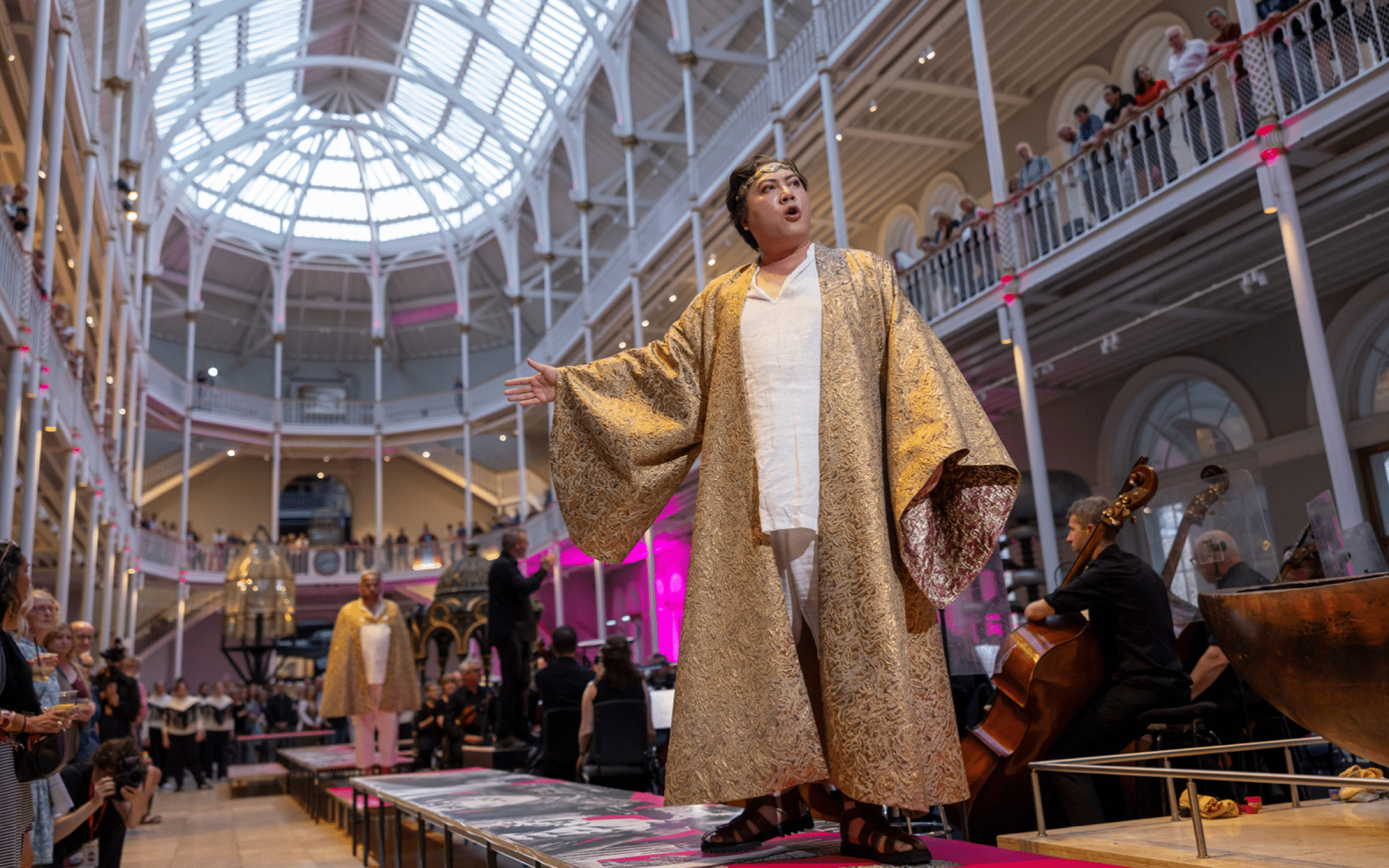Not so much “at” the opera. “In” the opera. Chumming with heroes, Oedipus, Jocasta, Creon, Tiresias, a well-intentioned shepherd, a community chorus, an irritating messenger, and an over-the-top Speaker. The Speaker provided a running commentary on Oedipus’s eye-popping antics.
The venue? The National Museum of Scotland, Edinburgh. Scottish Opera had decided to take Nicola Benedetti, Edinburgh International Festival Director’s injunction – “we invite you to join in communion with the artists on stage” – literally.
This was a promenade performance of Igor Stravinsky’s opera Oedipus Rex, the sell-out audience mixing with Greek aristos, chorus plebs and orchestra in the vast museum space. Or, hobnobbing with the Gods – and Scot Op had scattered a few around for selfies – in the wrought-iron encircled gallery above. Take your pick.
Oedipus Rex, written in Stravinsky’s neoclassical period, libretto by Jeanne Cocteau, is a concise one-act work offering music with the power to hammer home the Oedipus tragedy. Don’t entirely believe your own publicity. You may have, unawares, behaved badly at a forgotten crossroads in your life.
In Thebes, Oedipus is a hero. He has defeated the riddle-fixated citizen-consuming Sphinx in a tenth-round knockout and married Theban widow Queen, Jocasta.
All seems well, but there occurs a devastating Covid BC 500 outbreak. When they are not clogging the gutters with their corpses, Thebans are self-isolating all over the place. Oedipus pledges to reprise the Sphinx trick and save the people.
Meantime, Creon, Jocasta’s brother has been consulting the Delphic oracle and brings news that Thebes is being punished for sheltering the murderer of Laius, Jocasta’s late husband and former king.
Oedipus promises to unveil the villain and calls on the local soothsayer, Tiresias to name him/her. Tiresias seems shifty and says mysteriously, “Um, the King’s killer is a King himself”. Put in the frame – who else is a “King himself”? – Oedipus loses it and accuses Tiresias of wanting Creon to ascend the throne.
Jocasta arrives, hoping to calm the crowd. Oracles aren’t always what they’re cracked up to be. Blah! Blah! Didn’t an oracle predict Laius’s death at the hands of his son, when in fact he was clobbered by bandits at a crossroads?
Snafu. Oedipus remembers when en route to Thebes he killed an old man “where three roads met”. It seems to be a curiosity of Greek double standard mores that murdering any old man at a crossroads is OK, whereas murdering a king is not.
Then another damned messenger turning up with more bad news. Hot foot from Corinth, this one announces that King Polybus, Oedipus’s father, is dead. But it’s more complicated than that. There is a letter from Polybus saying, “Oedipus old chap, actually, you’re not my son. I found you and brought you up.”
Just when you don’t need one, in Greek mythology an unhelpful shepherd always seems to be on hand. “Yup, I’m the guy who found baby Oedipus in the mountains and took him to Polybus.”
Jocasta susses out the truth. She is Oedipus’s mother and Laius is his father. Why they left Oedipus on a mountain in the first place is unclear. She flees and kills herself. Tom Lehrer, the great American satirist put it this way:
“There once lived a man named Oedipus Rex
You may have heard about his odd complex
His name appears in Freud’s index
‘Cause he loved his mother.”
Oedipus is told of Jocasta’s death. He uses her pin to gouge out his own eyes, and goes wandering in exile, to the pain of his people who have lost their King and Queen.
“When he found what he had done
He tore his eyes out, one by one
A tragic end to a loyal son
Who loved his mother.”
The impact of the high-risk promenade concept was huge. The enlarged community chorus involved audience members, taking unlucky victims by the hand and giving impromptu choreography lessons. The complex moving parts were kept meticulously in sync. No mean feat.
Observed from a distance, as in conventional semi-staged versions, Stravinsky’s sound world is absorbing. Close up the impact was visceral. Like it or not, we were all in Thebes, part of the chorus, bulked up for the occasion with community singers, sporting wings.
The characters, who started posing on museum plinths, joined the action as the plot unfolded. We could follow their trajectories or simply wait. There would be another one along in a minute.
The role of Speaker was critical. While the sung lines are in Latin, the narration is in English. Cast as a fluorescent-coated high viz museum attendant, comedy TV actress Wendy Seager milked her part for all it was worth.
Seeing her museum exhibits – as she regarded them – coming to life Seager became emotionally involved in their tragedy. On occasions, she struggled to bring herself to deliver her tragic lines. Then, after a rousing Gloria chorus she stepped out of character and urged the conductors (there were three of them scattered about the hall) to deliver an encore.
Not the done thing. But, by now, Seager had the audience on her side. She prevailed. To huge acclaim.
Chinese tenor Shengzhi Ren, an emerging Scottish Opera young artist sang Oedipus, mezzo soprano, Kittie Whately, experienced in challenging contemporary roles was Jocasta and Roland Wood, a baritone acclaimed internationally for character roles, was Creon. All delivered strong performances. Full cast listing here.
The Orchestra of Scottish Opera under the baton of Stuart Stratford was more than on top of Stravinsky’s dazzling score.
Director Roxana Haines, who has provided many Scottish Opera successes, including semi-staged performances, will be associate director of Osvaldo Golijov’s Ainadamar at New York’s Metropolitan Opera in October, a co-production with Scottish Opera. An important moment for the Glasgow-based company in underscoring its international credentials.
Well-known for educational productions aimed at widening youth audiences, Haines can now tick off “popular” involvement on her score sheet. Hers was a triumphant delivery of a performance experiment that further enhances Scottish Opera’s reputation for artistic originality.
Meantime, Another Edinburgh Festival Thing!
“Why is there a washing machine?” I mused, to no-one in particular.
The unknown lady standing opposite, at a drinks table in Edinburgh’s Festival Theatre – that modern-fronted, ancient auditorium joke of an opera house – burst into life. “Actually, there are six.” Unusual props for the Festival production of Mozart’s The Marriage of Figaro.
Not unknown for long, Veronica Kinahan turned out to be an Audio Describer. This is an amazingly thoughtful service provided by Scottish Opera for audience members suffering from sight loss. Veronica was on loan to the Festival. Keen to speak her mind.
A generous gesture considering that Scottish Opera is consistently snubbed by Edinburgh Festival organisers, favouring other companies for their main stage productions. This year it was the turn of Komische Oper Berlin.
Proof of profession was offered as she turned proudly to show off the yellow lettering on her t-shirt. She had watched the Kirill Serebrennikov production in rehearsal and performance “for about 80 hours”, so when it came to pronouncing the number of washing machines in play, Veronica was the ultimate authority. A veritable oracle.
Serebrennikov is a Russian semi-exiled cutting-edge film director who dabbles in opera. This was to be his work. Mozart, Da Ponte and Beaumarchais hardly got a look-in. Hence the otiose “Capitalism kills love” illuminated script adorning the wall of the Count’s sitting room. The director hadn’t even bothered to go figure that Mozart’s Count is a feudalist. If anyone, Figaro is the capitalist in this Beaumarchais story.
“What’s the production like?”. “The music is wonderful, but best to watch it with your eyes shut”. A pessimistic recommendation. My oracle departed to provide her commentary. Sadly, Veronica Kinahan’s advice turned out to be prescient.
Thus discouraged, I surveyed the set, a two-tier stage – aristos living on top, plebs in a laundry and kitchen below – with a sense of impending doom.
The Russian director provided more than washing machines. Piled up cleaning clobber, shopping trolleys, ironing boards. The list of aimlessly trundled about detritus was endless.
The role of Cherubino was performed by a male mute acrobat, doubled, with some difficulty, by a singing black-clad mezzo soprano. The count was shadowed by a silent, slick-haired dancing supernumerary. Why? Revealing his true character? If so, clumsy and distracting.
The mortal sin was Serebrennikov’s complete failure to understand that amidst the comedy Mozart and Da Ponte provide islands of human insight and moving pathos. It is why The Marriage of Figaro is a masterpiece.
One of opera’s highlight moments, never mind Figaro’s, is the Contessa’s Act III aria, Dove Sono.
On her own, the Contessa reflects on the loss of her Count’s love, determines that up with this she will not put, pulls herself together and leaves transformed, with a firm purpose to best the philanderer. Which, with the help of her maid, smarty-pants Susannah, and Figaro she eventually does.
The aria is The Marriage of Figaro’s pivot point. Five minutes of intensely focused musical bliss, demanding total concentration. From the opening reflective five-note phrase to its soaring conclusion, the Contessa morphs from victim to one of the determined female characters who define Mozart’s operas, from Ilia in Idomeneo onwards.
What Serebrennikov delivered was simultaneous distracting action in the scrubs below and a Contessa who removed hairpieces, flung off a constraining corset – and actually screeched in frustration, head in hands, mid aria, where no screech is prescribed – above.
There was a potentially redeeming feature when Cherubino stripped off and leapt starkers from the window into the garden below. Perhaps he was gone for good. No such luck. Back, gyrating wildly in the following scene.
A fuller review would point to the poverty of voices. This was an undistinguished cast. “A good opera ruined”, commented a fellow member of the audience as we headed for the exit. Truly, German Staatsoper second division rubbish.
It is high time for Edinburgh Festival’s powers that be to consider bringing Scottish Opera back mainstage in Edinburgh.
Write to us with your comments to be considered for publication at letters@reaction.life





